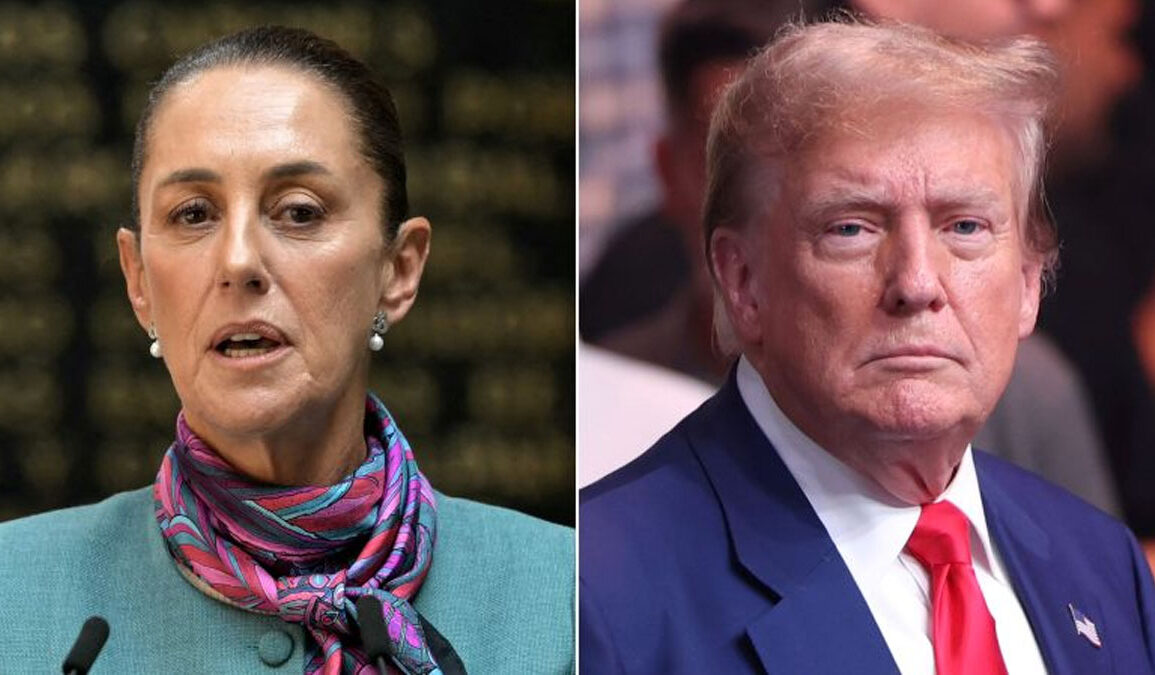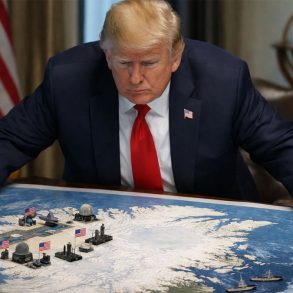A growing dispute between President Donald Trump and Mexican President Claudia Sheinbaum is creating tension between two countries that are trying to cooperate on immigration, trade, and security. At the center of the dispute is Trump’s demand to use U.S. military forces to go after Mexico’s drug cartels. Sheinbaum has firmly rejected the idea, calling it a threat to her country’s sovereignty.
While both leaders have said they are committed to cooperation, their recent discussions have exposed sharp disagreements about how far the U.S. can go to stop cartel activity, especially when it comes to fentanyl production and trafficking.
Trump Calls for Aggressive Military Action
President Trump has made the fight against Mexican drug cartels a top priority. In a 45-minute call with Sheinbaum on April 16, he urged her to allow U.S. armed forces to take a more direct role in fighting cartel groups. According to people familiar with the conversation, Trump suggested using drone strikes and special forces to hit cartel leaders and fentanyl labs inside Mexico. When Sheinbaum resisted, the tone of the call reportedly became tense.
“Mexico is very, very afraid of the cartels,” Trump said during an interview with the Spanish-language network of Fox News shortly after the phone call. “We want to help her. We want to help Mexico, because you can’t run a country like that. You just can’t.”
Trump’s administration has already designated several major cartels as foreign terrorist organizations. His border czar, Tom Homan, explained in March that Trump is prepared to “use the full might of the federal government to take them out.” Homan also said, “We’re not just going to attack them on the southern border, we’re going to attack them across the globe.”
The White House, along with the Defense Department and intelligence agencies, has been discussing the possibility of drone strikes and other military actions. While no final decisions have been made, sources told NBC News that “a unilateral covert action, without Mexico’s consent, had not been ruled out and could be an option of last resort.”
Sheinbaum Refuses Military Presence in Mexico – Does She Mean It?
President Sheinbaum has drawn a clear line. While she is willing to share intelligence and has made several concessions to the U.S., she will not allow foreign troops to operate on Mexican soil. “We don’t accept invasions or interference,” she said during a press conference on April 22. “We are not a protectorate or colony of any foreign country.”
Sheinbaum’s government has taken action against the cartels. Since taking office, her administration has destroyed 758 fentanyl and meth labs, doubled arms seizures, and extradited 29 cartel bosses to the United States. In February, she agreed to Trump’s request to send 10,000 troops to the northern border as part of “Operación Frontera.” These troops have already seized over 1.13 million fentanyl pills and 163 kilograms of fentanyl powder in the first two months.
Even with these results, Sheinbaum is facing pressure at home. The cartels continue to fight for control of territory across Mexico. Her administration believes that allowing a U.S. military presence would not only violate the Constitution but also weaken her political position. According to a Reuters report, Sheinbaum is even proposing a constitutional reform to defend Mexico’s sovereignty. “The Mexican people will under no circumstances accept interventions, intrusions, or any other action from abroad that are detrimental to the integrity, independence, or sovereignty of the nation,” she said.
One of the reasons Mexico is unwilling to accept U.S. troops is the long history of American invasions. Mexican officials have said that allowing armed U.S. forces into the country would reopen old wounds from previous conflicts, including two U.S. invasions since 1846.
Although both countries have built strong ties over the last few decades, including joint operations and intelligence sharing, the idea of U.S. drone strikes or special forces raids is too much for most Mexican leaders to accept.
Sheinbaum, who speaks fluent English and has lived in California, has tried to handle disagreements with Trump carefully. She has cooperated with the U.S. on immigration, agreed to restrict illegal border crossings, and provided water to Texas farmers. But she insists that respect for Mexican sovereignty is non-negotiable.
Trump’s allies argue that current efforts to stop the cartels are not enough. They believe the situation has become so dangerous that military force is necessary. Homeland Security Secretary Kristi Noem, who met with Sheinbaum in March, said the administration is committed to protecting Americans from foreign terrorist organizations and from the drugs and violence they bring into communities.
Supporters also point to the Drug Enforcement Administration’s own warnings. According to the DEA, “The deadly reach of the Mexican Sinaloa and Jalisco cartels into U.S. communities is extended by wholesale-level traffickers and street dealers bringing the cartels’ drugs to market, sometimes creating their own deadly drug mixtures, and exploiting social media and messaging applications to advertise and sell to customers.”
Trump’s defenders believe that cooperation alone won’t solve the problem. They argue that strong military action would not only help Americans but also show the cartels that the U.S. is serious about stopping them.
Critics Warn of Dangerous Consequences
However, many national security experts and former law enforcement officials believe Trump’s strategy could backfire. The Crisis Group, a global conflict monitoring organization, warned that any military move could be seen by Sheinbaum’s political opponents as a failure of leadership. “She could halt law enforcement cooperation or return to Lopez Obrador’s laissez-faire approach to fentanyl trafficking,” the group wrote in a recent report. “She might soft-pedal immigration enforcement or kick the DEA, FBI and other U.S. agencies out of the country.”
Others warn that military action would severely damage U.S.-Mexico relations. Mike Vigil, former chief of international operations for the DEA, said the problem cannot be solved by force. “It’s not a military problem. It’s more of a law enforcement problem,” he told NBC News.
Experts believe the U.S. needs to focus more on non-military strategies, such as using scanning equipment at ports of entry, cracking down on money laundering, and working with private companies to monitor chemical sales used to make fentanyl.
Trade Talks Continue Amid Rising Tensions
Despite the security clash, Trump and Sheinbaum continue to work together on trade issues. On May 1, Sheinbaum said she had a “very positive” conversation with Trump about improving the trade balance between the two countries. “The important thing is that we’re working on it,” she said. “And there’s a desire on the part of the U.S. government and ours to reach even better trade agreements.”
The United States had a goods trade deficit with Mexico of nearly $172 billion in 2024. Trump has already imposed a 25 percent tariff on some Mexican exports, hoping to pressure Sheinbaum into stronger action on fentanyl and border security. While tariffs on vehicles have recently been eased, the U.S. still has duties on steel and aluminum imports from Mexico.
The growing divide between Trump and Sheinbaum over how to fight drug cartels has the potential to shift U.S.-Mexico relations for years to come. Trump is demanding results. Sheinbaum is insisting on respect. As both sides dig in, the question remains whether they can find a path forward that protects both national security and national pride.
NP Editor: Mexico and the U.S. are like brother and sister, they will argue and they will deny, but in the end they are too close to come to blows. The cartels are massively influential, some say are in control. Trump is hoping to find a way to help Sheinbaum shed them.
But straight up aid to the Mexican military and police forces will not work. The cartels, from Colombia, Mexico and across the world, have a simple method of gaining recruits within the police and military, known as “plomo o plata.” It goes something like …. “You can work for us and we will pay you million dollars or you can refuse and we will rape your wife, torture your children in front of you and then kill you.”
It is very effective.
So it is difficult to trust the Mexican authorities to not be penetrated. The result is that when you go to attack the cartel, they know in advance and are simply not there. Thus the offer to use the U.S. military.








